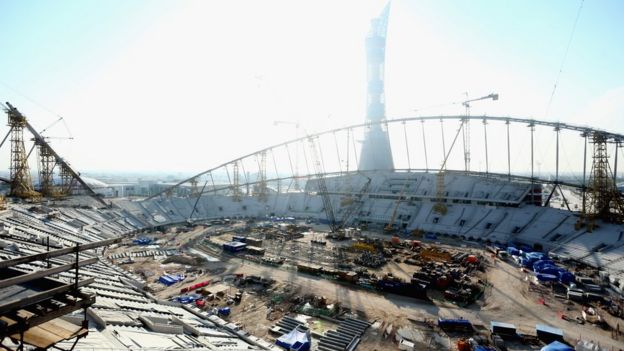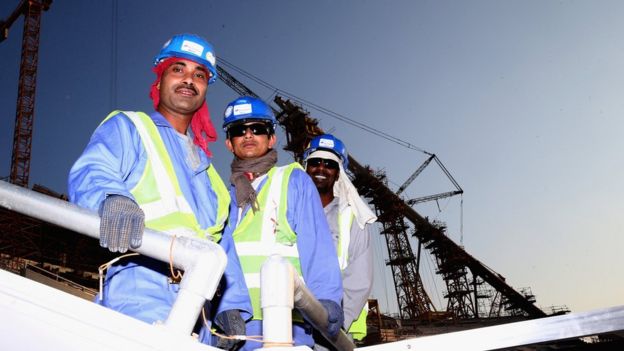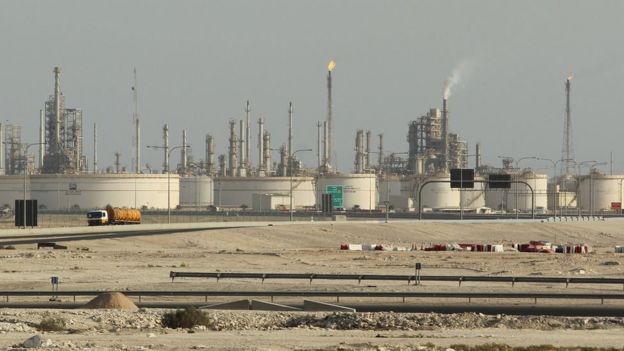The energy-rich Arab emirate of Qatar is one of the wealthiest countries in the world, with a reputation for lavish spending and generous state handouts.
Qatar has bought up banks across the globe, football clubs in Europe, and properties in the heart of London with some of the highest price tags on the planet.
But the worldwide energy price slump is putting pressure on the small Gulf country, highlighted by cutbacks to flagship projects and talk of reforms being made to its subsidies and tax systems.
Is this a signal that the economic superpower is finally feeling the financial squeeze?
Spending cuts
Qatar’s financial cuts have been extensive – encompassing development projects, cultural schemes, education, transport and its 2022 football World Cup spending.
The country is focusing on completing its 2022 World Cup stadiums, which are estimated to cost some $220bn (£155bn), although in 2014 the government reduced the number of planned stadiums from 12 to eight as costs spiralled.
 Image copyrightGetty Images
Image copyrightGetty ImagesBut it is not just Qatar’s lavish spending on the World Cup that is being targeted.
Qatar Rail announced in January that it had sacked 50 employees as part of a “business efficiency review”.
Energy firms RasGas, Qatar Petroleum and Maersk Oil Qatar have laid-off thousands of employees since 2014.
The Sidra Medical and Research Centre, funded by the Qatar Foundation – a non-profit body – has announced staff cuts.
Cuts at the foundation have also led to the end of a partnership with Bloomsbury Publishing, reduced spending on the film industry, and cuts to university budgets.
Qatar’s Museum Authority announced in January that 250 staff had been laid off and plans for two new museums shelved.
 Image copyrightAl Jazeera
Image copyrightAl JazeeraAnd since the start of 2016, broadcaster Al-Jazeera has laid off more than 1,000 staff at its global offices and headquarters and has closed Al-Jazeera America.
Qatar has also indicated that it plans to privatise some state-run firms.
The country’s generous subsidy system is a major cash drain. It is thought that subsidies will be cut back to exclude foreign nationals.
 Image copyrightGetty Images
Image copyrightGetty ImagesThis is particularly pressing because of a rapid influx of foreign labour, which has driven the population figure up by 40% since 2010.
The country raised petrol costs by more than 30% in January to combat its deficit with just a few hours’ notice.
With up to 1,000 troops in Yemen as part of the Saudi-led campaign against Houthi rebels, Qatar is involved in one of its largest-ever military engagements.
It is expanding its military – on which it spent $23bn in 2014 alone – possibly as a reaction to the threat posed by militants from the so-called Islamic State group, and growing tensions between Gulf Cooperation Council (GCC) countries and Iran.
Reducing dependency
Bucking a 15-year trend, Qatar predicts a budget deficit of almost $13bn for 2016. Its financial dependency on oil and gas is likely to be behind this.
The global price of a barrel of oil has plummeted by more than 70% since June 2014.
 Image copyrightGetty Images
Image copyrightGetty ImagesLast November, Development Minister Saleh Mohammad Al Nabit said pressure on state finances meant that the government had to be more disciplined in its spending.
International Monetary Fund chief Christine Lagarde has also urged Doha to make tax and spending reforms.
Qatar’s ruler, Tamim bin Hamad Al Thani, said in November 2015 that he hoped the fall in energy prices would reduce dependency on the state, warning against “wasteful spending, overstaffing and a lack of accountability”.
Qatar’s wide scale cutbacks to its workforce certainly seem to fall in line with his wishes.



